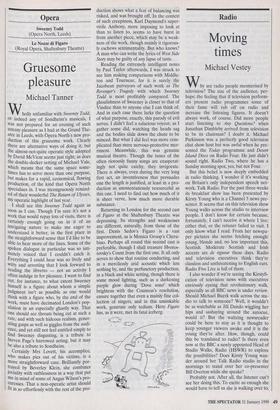Opera
Sweeney Todd (Opera North, Leeds) Le Nozze di Figaro
(Royal Opera, Shaftesbury Theatre)
Gruesome pleasure
Michael Tanner
Wholly unfamiliar with Sweeney Todd, or indeed any of Sondheim's musicals, I was not prepared for an evening of such uneasy pleasure as I had at the Grand The- atre in Leeds, with Opera North's new pro- duction of this gruesome work. Clearly there are alternative ways of doing it, but the almost-not-quite operatic style adopted by David McVicar seems just right; as does the double-decker setting of Michael Vale, Which means that the same space some- times has to serve more than one purpose, but makes for a rapid, economical, flowing production, of the kind that Opera North Specialises in. I was incongruously remind- ed of their wonderful The Return of Ulysses, my operatic highlight of last year. I shall see this Sweeney Todd again as soon as I can. Though I'm sure it's not a work that would repay lots of visits, there is certainly enough going on in it of an intriguing nature to make me eager to understand it better, in the first place in the straightforward sense that I'd like to be able to hear more of the lines. Some of the Spoken dialogue in particular was so inti- mately voiced that I couldn't catch it. Everything I could hear was so lively and Witty and arresting that I look forward to reading the libretto — not an activity I often indulge in for pleasure. I want to find out, for instance, to what extent Sweeney himself is a figure about whom a simple Judgment isn't as possible as one would think with a figure who, by the end of the work, must have decimated London's pop- ulation in an especially ghastly way. That one should see throats being cut at such a rate, and with such hideous realism, gener- ating gasps as well as giggles from the audi- ence, and yet still not feel entitled simply to find Sweeney disgusting, is a tribute to Steven Page's harrowed acting; but it may be also a tribute to Sondheim.
Certainly Mrs Lovett, his accomplice, who makes pies out of his victims, is a more straightforward case. Brilliantly por- trayed by Beverley Klein, she combines Joviality with ruthlessness in a way that put me in mind of some of Angus Wilson's pro- euresses. That a non-operatic artist should fit in so effortlessly with the rest of the pro- duction shows what a feat of balancing was risked, and was brought off. In the context of such creepiness, Karl Daymond's super- virile Anthony, more imposing to look at than to listen to, seems to have burst in from another piece, which may be a weak- ness of the work, though mainly it rigorous- ly eschews sentimentality. But who knows? A man who can write the lyrics of West Side Story may be guilty of any lapse of taste.
Reading the extremely intelligent notes by Paul Taylor afterwards, I was struck to see him making comparisons with Middle- ton and Tourneur, for it is surely the Jacobean purveyors of such work as The Revenger's Tragedy with which Sweeney Todd is most profitably compared. The ghoulishness of Sweeney is closer to that of Vindice than to anyone else I can think of. And in each case there lurks the question of what purpose, exactly, this parody of evil serves. I didn't feel a salacious voyeur, as I gather some did, watching the heads sag and the bodies slide down the chute to be minced. But what I did feel was more com- plicated than mere nervous-protective mer- riment. Meanwhile, this was genuine musical theatre. Though the tunes of the often riotously funny songs are exasperat- ingly not quite catchy, they invigorate. There is always, even during the very long first act, an inventiveness that persuades one the length is justified, at least in a pro- duction as unostentatiously resourceful as this one. I need to find out how much of it is sheer verve, how much more durable substance.
Returning to London for the second cast of Figaro at the Shaftesbury Theatre was depressing. Its strengths and weaknesses are different, naturally, from those of the first. Denis Sedov's Figaro is a vast improvement, as is Monica Groop's Cheru- bino. Perhaps all round this second cast is preferable, though I shall treasure Hvoros- tovsky's Count from the first one. It all only serves to show that routine conducting, and in a mercilessly arid acoustic which lets nothing by, and the perfunctory production, in a black and white setting, though there is some mood lighting, such as a darkening purple glow during 'Dove sono' which brightens with the Countess's resolution, ensure together that even a mainly fine col- lection of singers, and in this unsinkable work, generate only tedium. Here Figaro has, as it were, met its fatal iceberg.


































































 Previous page
Previous page